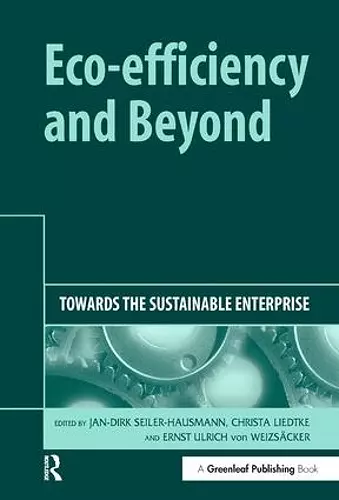Eco-efficiency and Beyond
Towards the Sustainable Enterprise
Ernst Ulrich von Weizsacker editor Jan-Dirk Seiler-Hausmann editor Christa Liedtke editor
Format:Hardback
Publisher:Taylor & Francis Ltd
Published:1st Jan '04
Currently unavailable, and unfortunately no date known when it will be back

Not simply the past and present of eco-efficiency but looking forward to a future where the comprehensive take-up of the concept leads to innovation on a grand scale and a giant leap towards sustainability. "this compilation of essays from an impressive range of sustainability experts shows how and where those at the leading edge are taking the debate." Corporate Citizenship Briefing
Goes beyond explaining the past and present of eco-efficiency to look forward to a future where the comprehensive take-up of the concept by business, government and consumers could lead to innovation on a grand scale and the possibility of a giant leap towards overall sustainability.
Business-as-usual, it is widely accepted, will exceed the Earth's carrying capacity in an alarmingly short space of time. In simple terms, we need to learn to use the world's rapidly depleting resources in a significantly more efficient manner. Practical and readily adopted solutions are needed now. Eco-efficiency-or "produce more with less" – is achieved when goods and services satisfy human needs, increase the quality of life at competitive prices and when environmental impacts and resource intensity are decreased to a degree that keeps them within the limits of Earth's expected carrying capacity. Eco-efficiency – a term first proposed by the World Business Council for Sustainable Development in 1992 – is a management approach that allows businesses to carry out environmental protection measures from a market-oriented point of view, with the aim of illustrating that ecology and the economy do not need to be a contradiction. Indeed, eco-efficiency has been portrayed as a win-win-for both business and the environment.
This book, which developed out of two conferences on eco-efficiency held in Düsseldorf in 1998 and 2001, is edited by Ernst Ulrich von Weizsäcker and his team from the Wuppertal Institute for Climate, Environment and Energy, one of the world's leading research programmes on resource productivity. The aim is not simply to explain the past and present of eco-efficiency but to look forward to and encourage a future where the comprehensive take-up of the concept by business, government and consumers could lead to innovation on a grand scale and the possibility of a giant leap beyond towards overall sustainability.
There have been considerable achievements to date. The Dow Jones Sustainability Index, which aims to list the most sustainable corporations for investors, includes companies such as BASF, Climatex, Henkel and Matushita/Panasonic (all represented in this book), who are implementing eco-efficiency measures. A number of political initiatives have also been formed. In December 2001, the German government suggested a National Sustainability Strategy to measure Germany's sustainable development. While this not yet an accepted political target...
...this compilation of essays from an impressive range of sustainability experts shows how and where those at the leading edge are taking the debate. - Corporate Citizenship Briefing, February/March 2004 |
| The main strength of this book is that it discusses eco-efficiency at a practical level of applications. In this way the concept becomes tangible and the authors clearly go beyond the theory ... It is required reading for business, government, NGOs and academics, in the field of business management. - International Journal of Environment and Pollution Vol. 23 No. 4 (2005)
ISBN: 9781874719601
Dimensions: unknown
Weight: 544g
248 pages